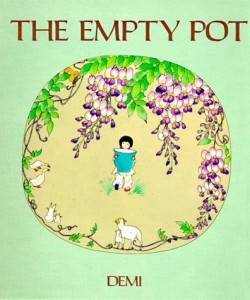News & Calendar:
- Log your reading days from last week on the website: www.RTSUtah.com (or in your planner if you do not have internet access.)
- Happy St. Patrick’s Day and Happy Birthday to Mrs. Pitts on Tuesday!
- Thank you to everyone who made donations and/or sold cookie dough, etc. for our school fundraiser so far! The last day to turn in orders collected is this Thursday, March 19th.
- This is the last week of Quarter 3, which means ReadnQuiz goal is due this Thursday!
- Thursday is an early-out day since Friday is a Teacher-Work day, when teachers will be finalizing grades.
Main Objectives for this week:
Students will be able to…
… read and comprehend this week’s selection, “The Empty Pot,” focusing on the comprehension strategy “Making Connections.”
… learn and use these new vocabulary words: fear, transferred, sprout, courage, tended, emperor, kingdom, and blossom.
… use commas in dialogue.
… read and retell the decodable story #41: “Kim & the Wave.”
… read and practice this week’s poem: “I Am Lucky”
…continue working on our Pet Rock Trading Cards & Acrostic Poems.
Objectives from our “Imagine It!” Program:
Reading Literature:
- I can ask and answer questions to show I understand important details in a story.
- I can retell a folktale and explain the moral or lesson of the story.
- I can describe how problems are solved throughout the story.
- I can read and understand stories by predicting, summarizing, and making connections.
Reading Foundational Skills:
- I can read the suffixes –less and –ful, independently and behind base/root words.
- I can read words using the different sounds of the ough spelling pattern (dough, rough, thought).
- I can read irregularly spelled words both in isolation, and in text.
- To comprehend, I can identify the purpose of a text, and check my understanding throughout my reading.
- I can fluently read on-level text focusing on accuracy.
- I can use context clues to help me figure out the meanings of words.
Writing:
- I can strengthen my writing by revising and editing content, capitalization, punctuation, and grammar.
- I can make conjectures (predictions) based on what I already know about courage.
Speaking and Listening:
- I can follow rules for participating in discussions including listening, asking appropriate questions, building upon others comments, and staying on topic.
- I can record my story using a computer or other digital recorder to share with others.
- I can add visual displays to my writing to add meaning.
Language:
- I can spell words using the “ough” spelling pattern.
- I can identify and use context clues to find the meanings of unknown or multiple meaning words.
- I can discover and use new words and phrases through reading, listening, and conversation.
Spelling
- dough
- cough
- fought
- tough
- ought
- enough
- though
- rough
- thought
- bought
- thorough
- although
- thoughtful
- throughout
- sourdough
Spelling Homework this week: .
Monday– “Copy 3x”= copy the words you missed on the pretest 3 times
Tuesday & Wednesday– Choose any two other ways to study your words, including any of the following:
“Triple Color Words”= write words in pencil, then trace over top using 3 different colors
“5 Sentences”= write 5 Sentences with at least 1 spelling word in each sentence
“Snap-Clap”= spell the word out loud while clapping for the consonants, & snapping for the vowels
Thursday– Test!
Common Core Standards we are focusing on that match this week’s objectives:
RL 2.1: Ask and answer such questions as who, what, where, when, why and how to demonstrate understanding of key details in a text. (T206-T207, T219, T221)
RL 2.2: Recount stories, including fables and folktales from diverse cultures, and determine their central message, lesson, or moral. (T222, T224-T225, T245)
RL 2.5: Describe the overall structure of a story, including describing how the beginning introduces the story and the ending concludes the action. (T233, T235, T245)
RL 2.10: By the end of the year, read and comprehend literature, including stories and poetry, in the grades 2-3 text complexity band proficiently, with scaffolding as needed at the high end of the range. (T206-T209, T218-T221)
RF 2.3.d: Decode words with common prefixes and suffixes. (T230-T231, T243)
RF 2.3.e: Identify words with inconsistent but common spelling-sound correspondences. (T194-T195, T216-T217)
RF 2.3.f: Recognize and read grade-appropriate irregularly spelled words. (T196-T197)
RF 2.4.a: Read on-level text with purpose and understanding. (T199, T247)
RF 2.4.b: Read on-level text orally with accuracy, appropriate rate, and expression on successive readings. (T237)
RF 2.4.c: Use context to confirm or self-correct word recognition and understanding, rereading as necessary. (T200-T201)
W 2.5: With guidance and support from adults and peers, focus on a topic and strengthen writing as needed by revising and editing. (T252-T253)
W 2.7: Participate in shared research and writing projects (e.g., read a number of books on a single topic to produce a report; record science observations). (T210-T211)
SL 2.1.b: Build on others’ talk in conversations by linking their comments to the remarks of others. (T222)
SL 2.5: Create audio recordings of stories or poems; add drawings or other visual displays to stories or recounts of experiences when appropriate to clarify ideas, thoughts, and feelings. (T260)
L 2.2.d: Generalize learned spelling patterns when writing words (e.g., cage – badge; boy – boil). (T240)
L 2.4.a: Use sentence-level context as a clue to the meaning of a word or phrase. (T200-T201)
L 2.6: Use words and phrases acquired through conversations, reading and being read to, and responding to texts, including using adjectives and adverbs to describe (e.g., When other kids are happy that makes me happy). (T222, T224-T225)
Mystery Question!
Your student will receive a Skyhawk SOAR Ticket if he or she can answer the “Mystery Question” in his or her planner or on a piece of paper sometime before Friday:
What is something that you have done that took courage?
